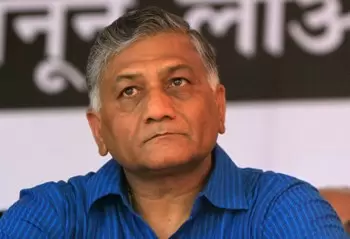A year when non-fiction with juicy revelations grabbed the headlines
28-December-2013
Vol 4 | Issue 52
Non-fiction ruled the roost in 2013, with many revelations the works threw up making for screaming headlines. These juicy tidbits also helped in boosting sales across India.
The writings spanned a variety of genres - politics, history, business and international terrorism, as also memoirs.
Grabbing the most news headlines was former Indian Army chief Gen. V.K. Singh's "Courage and Convictions", an autobiography that revealed that "a very senior bureaucrat" in the Prime Minister's Office was "orchestrating" the age row that marked the last year of his tenure.
 |
|
V K Singh's book grabbed the most headlines (Photo: Indian Photo Agency)
|
This soon grabbed the headlines and Gen. Singh was giving interviews thick and fast to every news channel and print outlet of note.
"If a book gets favourable reviews in the media, it certainly helps the sales nation-wide," said Anuj Bahri, CEO of Bahri Sons, a leading Delhi-based publisher and distributer.
This was followed by the "The Siege: The Attack on the Taj", based on the 26/11 Mumbai terror attack, with authors Adrian Levy and Cathy Scott-Clark revealing how the ISI Pakistani intelligence agency used "a super-agent" based in New Delhi and code-named "Honey Bee" to help facilitate the deadly assault that claimed 166 lives.
The contents immediately caught the news headlines as publishers chose to release the book around the fifth anniversary of the Nov 26-29, 2008, attack.
"In the case of non-fiction, the subject drives the marketing plan. For instance, one would market a travel book differently from a cookbook and a book on current affairs would require a different plan," said Gautam Padmanabhan, CEO of publishing house Westland.
In a scenario where commercial literature is hitting the bookshelves every other day, publishers feel that non-fiction has a niche audience.
"Non-fiction publishing is a lot safer than fiction as the target audience is very clear and the buying decision is more need-based than compulsive," Padmanabhan explained.
"Publishing commercial fiction is like the movie business on a smaller scale," he added.
"In India, non-fiction is more popular than fiction. Commercial fiction is simply time pass, literary fiction provides stimulus to the mind and non-fiction is pure knowledge," said Bahri.
While good fiction demands great imagination, non-fiction requires more research, observation of facts and history and drawing a few conclusions here and there.
This is what Rajmohan Gandhi's "Punjab: A History from Aurangzeb to Mountbatten" had in ample, with the author throwing light on the history of undivided Punjab and the people who ruled it.
He also brought to the forefront the much neglected contribution of Punjabi Muslims in the pre-partition era.
Another interesting book this year was historian and author Ramachandra Guha's "Gandhi Before India", tracing the Mahatma's formative years, his life as a student, his early years in South Africa and people who shaped up his ideology.
Anita Raghavan's true-life business thriller "The Billionaire's Apprentice" chronicled the rise and fall of business tycoon Raj Rajaratnam and financial consultant Rajat Gupta, who were convicted on multiple counts of securities fraud in separate trials in a US court.
Gupta, the former managing director of McKinsey & Co and a board member of Goldman Sachs Group Inc. was convicted of passing inside information to Sri Lankan hedge fund billionaire Rajaratnam.
Then, there was Fahad Shah's "Occupation and Resistance" - a compilation of stories by people of the Kashmir Valley about their many joys, sorrows and fears and Gary J Bass's "The Blood Telegram: India's Secret war in East Pakistan" chronicling the break-up of Pakistan in 1971 and India's role in this.
Now, here's a reality check.
Despite making its presence felt amongst serious readers, Bahri feels the non-fiction market is still "untapped".
"This section has still not reaching its true potential. The quality of writing and editing in the non-fiction genre has still to go a long way," Bahri contended.
On that note, let's see how 2014 pans out. - IANS














